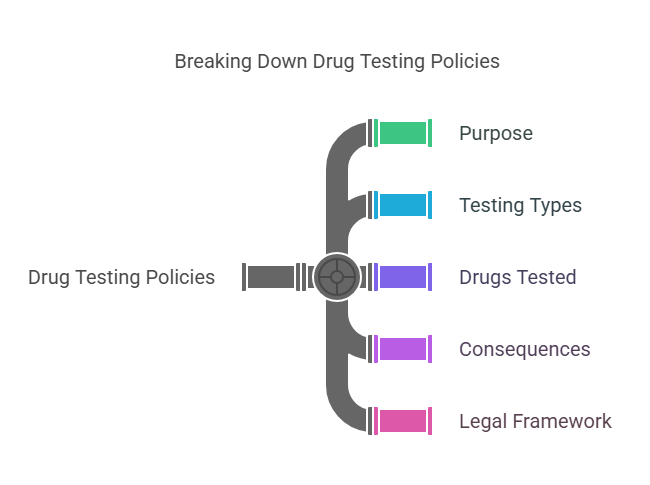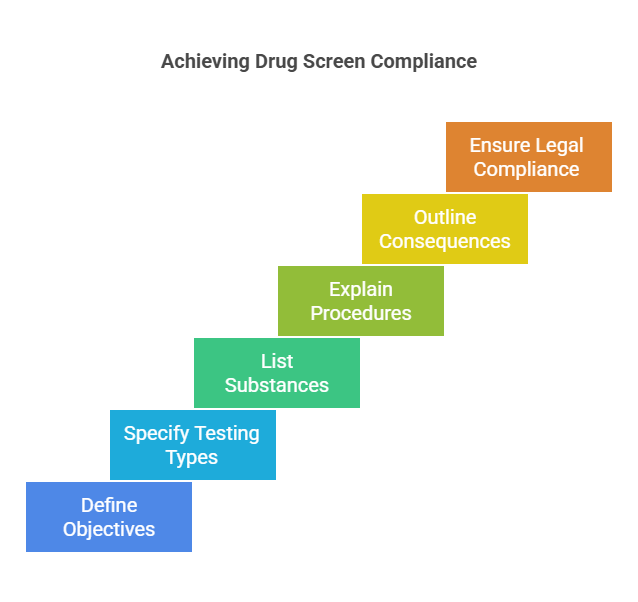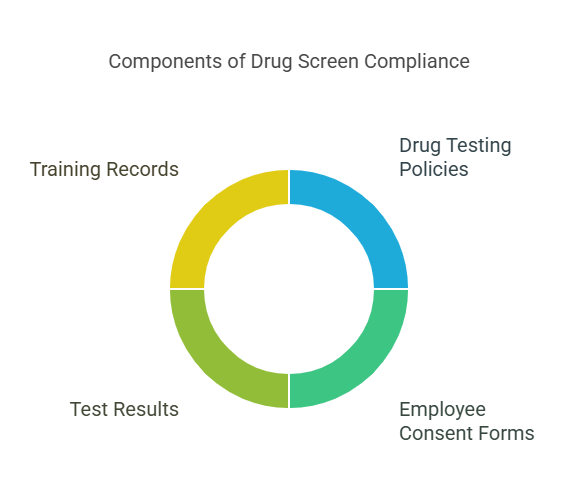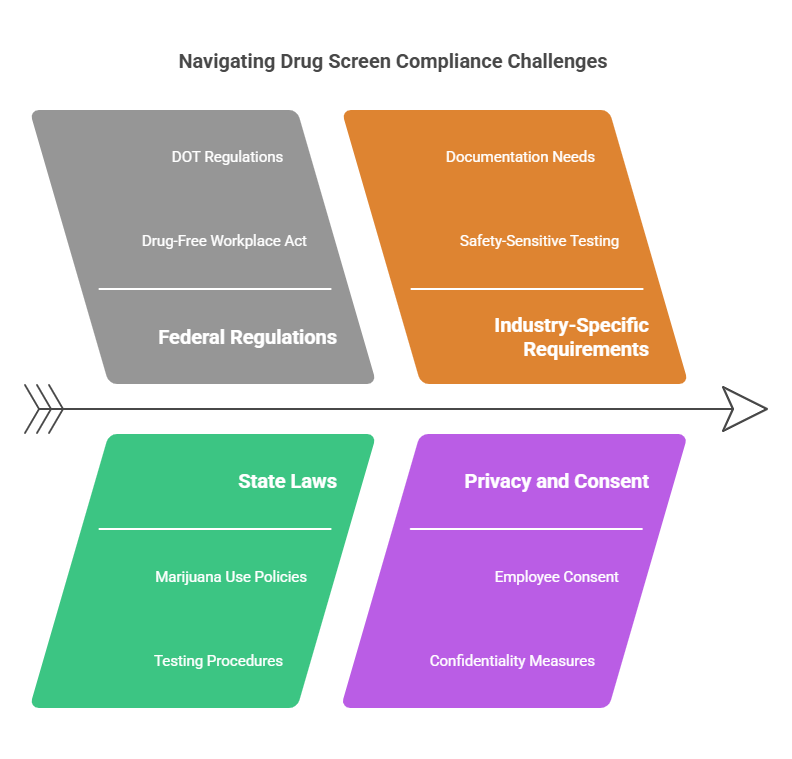Essential Tips for Drug Screen Compliance

Drug Screen Compliance: What You Need to Know
Drug screen compliance plays a critical role in maintaining workplace safety, ensuring legal adherence, and protecting an organization’s reputation. This article will explore the fundamentals of drug screen compliance, its importance across various industries, and the potential consequences of non-compliance.
What Is Drug Screen Compliance?
Drug screen compliance refers to an organization’s adherence to legal, ethical, and policy-based requirements regarding drug testing. These regulations are designed to promote a safe and drug-free work environment, reduce liabilities, and ensure compliance with federal and state laws.
Drug screening is not only a preventative measure but also a means of reinforcing workplace policies that prioritize safety and productivity. For employers, drug screen compliance demonstrates a commitment to legal and ethical responsibilities, fostering trust with employees, clients, and stakeholders.
Key Components of Drug Screen Compliance

1. Drug Testing Policies
A compliant drug testing policy serves as the foundation for workplace drug screening. These policies should outline:
- Purpose: Why the organization conducts drug testing (e.g., safety, productivity, or legal compliance).
- Testing Types: Pre-employment, random, post-accident, and reasonable suspicion testing.
- Drugs Tested: A list of prohibited substances (e.g., THC, opioids, amphetamines).
- Consequences: Disciplinary actions for policy violations.
- Legal Framework: State-specific and federal laws guiding the policy.
2. Types of Drug Tests
Employers can choose from several drug testing methods based on their goals and budget:
| Test Type | Method | Detection Window | Common Uses |
|---|---|---|---|
| Urine Test | Analyzes urine | 1-5 days (most substances) | Pre-employment, random testing |
| Saliva Test | Oral swab | 24-48 hours | Post-accident, reasonable suspicion |
| Blood Test | Blood sample | 1-48 hours | Highly accurate, rarely used |
| Hair Follicle Test | Hair sample | Up to 90 days | Long-term substance use |
Each testing method has its advantages and limitations. For example, urine tests are cost-effective and widely used, while hair follicle tests provide a longer detection period but at a higher cost.
3. Compliance with Federal and State Regulations
Employers must navigate various laws to ensure compliance, such as:
- Department of Transportation (DOT) Requirements: Industries like transportation must follow DOT drug and alcohol testing rules.
- OSHA Regulations: Occupational Safety and Health Administration (OSHA) guidelines ensure that post-accident drug testing does not deter injury reporting.
- State-Specific Laws: Marijuana legalization and drug testing restrictions vary significantly by state.
4. Industries Requiring Drug Screen Compliance
Drug screen compliance is particularly critical in safety-sensitive industries:
- Transportation: Ensures drivers and operators are fit for duty.
- Healthcare: Protects patients and maintains trust in caregiving.
- Construction: Prevents accidents on hazardous worksites.
- Manufacturing: Reduces risks in high-stakes environments.
Consequences of Non-Compliance
Failing to comply with drug screening requirements can result in severe repercussions:
1. Legal Penalties
Non-compliance with federal or state laws can lead to lawsuits, hefty fines, or the loss of government contracts.
2. Workplace Safety Risks
Impairment due to substance use increases the likelihood of workplace accidents, endangering employees and customers.
3. Damage to Organizational Reputation
A company’s reputation can suffer when incidents related to substance abuse occur, leading to diminished trust among stakeholders.
Steps to Ensure Drug Screen Compliance

1. Develop Comprehensive Drug and Alcohol Testing Policies
A clear and comprehensive drug and alcohol testing policy is the foundation of compliance. It not only establishes guidelines for employees but also demonstrates the organization’s commitment to safety and adherence to legal requirements.
To create an effective policy:
- Define Objectives: Clearly state the purpose of drug testing, such as promoting workplace safety, preventing substance abuse, or complying with industry-specific regulations.
- Specify Testing Types: Outline when tests will be conducted, such as pre-employment, random testing, post-accident, or based on reasonable suspicion.
- List Substances: Provide a detailed list of prohibited substances, including illegal drugs, prescription medications that may impair performance, and alcohol.
- Explain Procedures: Describe how samples will be collected, tested, and reported, ensuring that employees understand the process.
- Outline Consequences: Specify the actions the organization will take in response to positive test results, policy violations, or refusal to participate in testing.
- Ensure Legal Compliance: Include references to federal, state, and industry-specific regulations to demonstrate adherence to legal requirements.
Regularly reviewing and updating the policy ensures it stays aligned with evolving laws and workplace needs.
2. Educate Employees About Drug Screen Policies
Employee education is a critical aspect of drug screen compliance. A well-informed workforce is more likely to comply with policies and understand the importance of maintaining a safe and drug-free workplace.
Key steps for effective education include:
- Policy Distribution: Provide employees with a copy of the drug testing policy during onboarding and ensure it is easily accessible.
- Training Sessions: Conduct regular training sessions to explain the purpose of drug testing, the testing process, and employees’ rights and responsibilities.
- Addressing Concerns: Create an open forum where employees can ask questions and express concerns about privacy, confidentiality, or the potential impact of testing on their roles.
- Ongoing Communication: Reinforce the importance of compliance through internal communications, such as newsletters, emails, or posters.
Transparency and communication help foster trust, making employees more comfortable with drug testing policies.
3. Partner With Reputable Third-Party Drug Screening Providers
Collaborating with experienced third-party providers simplifies the drug screening process, ensuring accuracy, efficiency, and compliance. Providers like Precise Hire offer comprehensive services tailored to organizational needs.
Advantages of Third-Party Providers:
- Accuracy and Reliability: Third-party providers utilize state-of-the-art testing methods to deliver accurate and reliable results.
- Regulatory Expertise: These providers stay updated on federal, state, and industry-specific regulations, helping businesses navigate complex legal requirements.
- Confidentiality and Security: Partnering with a trusted provider ensures that sensitive employee information and test results are handled securely and confidentially.
- Efficiency: Outsourcing drug testing reduces the administrative burden on HR teams, allowing them to focus on other responsibilities.
How Precise Hire Can Help:
- Offers a wide range of testing options, including urine, saliva, blood, and hair follicle tests.
- Provides fast and accurate test results through a secure online portal.
- Customizes drug screening programs to meet the unique needs of industries like transportation, healthcare, and construction.
- Ensures compliance with federal laws such as DOT regulations and state-specific requirements, including those related to marijuana use.
4. Regular Training for HR Personnel
HR professionals are responsible for implementing and enforcing drug testing policies, making their training a crucial component of compliance. Regular training sessions for HR staff should cover:
- Legal Updates: Keeping HR personnel informed about changes in federal and state laws related to drug screening.
- Policy Enforcement: Training HR staff on how to handle testing procedures, address employee concerns, and document compliance effectively.
- Dispute Resolution: Equipping HR professionals with the skills to manage disputes or appeals related to drug test results.
Investing in HR training ensures that the team can execute compliance-related tasks confidently and professionally.
The Role of Record-Keeping and Documentation in Compliance

Maintaining accurate and organized records is a critical aspect of drug screen compliance. These records serve as proof of adherence to laws and policies during audits, legal disputes, or inspections.
Essential documents to retain include:
- Drug Testing Policies: A copy of the organization’s policy outlining the purpose, procedures, and consequences of drug testing.
- Employee Consent Forms: Signed agreements from employees acknowledging their understanding and acceptance of the drug testing policy.
- Test Results: Documentation of test results, actions taken for positive results, and records of follow-up testing, if applicable.
- Training Records: Proof of employee and HR training sessions, including attendance records and training materials.
Using digital platforms for secure storage and easy retrieval of records can simplify the documentation process and ensure readiness for audits or legal inquiries.
How Precise Hire Supports Compliance
Precise Hire is a trusted provider of drug screening services, offering tailored solutions to help businesses maintain compliance. Their services include:
- Customized Testing Programs: Designed to meet the specific needs of industries with varying levels of regulatory requirements.
- Advanced Testing Methods: A variety of testing options to ensure accuracy and reliability.
- Secure Online Platform: Streamlined access to test results and documentation, simplifying record-keeping for compliance purposes.
- Expert Guidance: Assistance in navigating complex legal frameworks, ensuring adherence to both federal and state laws.
By partnering with Precise Hire, organizations can confidently maintain compliance while focusing on their core operations.
Legal Aspects of Drug Screen Compliance

Drug screen compliance is regulated by a combination of federal, state, and industry-specific laws. Failing to adhere to these regulations can result in lawsuits, fines, and reputational damage. Below is a detailed overview of the legal framework organizations must navigate.
1. Federal Drug-Free Workplace Act
The Federal Drug-Free Workplace Act (DFWA) applies to federal contractors and organizations receiving federal grants. Key requirements include:
- Implementing a drug-free workplace policy.
- Conducting drug awareness programs for employees.
- Reporting drug-related convictions of employees to federal agencies.
Although the DFWA does not mandate drug testing, many organizations include testing to comply with its provisions.
2. Department of Transportation (DOT) Regulations
For safety-sensitive industries such as transportation, DOT regulations require stringent drug and alcohol testing. Covered employees include commercial drivers, pilots, and railroad workers. Key elements of DOT compliance include:
- Pre-employment, random, and post-accident drug testing.
- Testing for substances like marijuana, cocaine, opioids, amphetamines, and PCP.
- Maintaining proper documentation for audits.
3. State-Specific Drug Testing Laws
State laws governing drug testing vary widely, particularly concerning:
- Marijuana Use: Some states prohibit discrimination against employees for off-duty marijuana use, while others allow employers to enforce zero-tolerance policies.
- Testing Procedures: States may regulate how tests are conducted, including sample collection and chain-of-custody requirements.
- Employee Protections: Many states require employers to provide advance notice of drug testing policies and obtain written consent.
Employers must understand and comply with state-specific laws to avoid legal challenges.
4. Employee Consent and Privacy Protections
Obtaining employee consent before drug testing is not only a legal requirement in most states but also a best practice for fostering trust. Additionally, employers must ensure:
- Confidential handling of drug test results.
- Limited access to sensitive information.
- Adherence to privacy laws, such as the Health Insurance Portability and Accountability Act (HIPAA), when applicable.
FAQs About Drug Screen Compliance
To help employers navigate common challenges, here are answers to frequently asked questions about drug screen compliance.
What Is Drug Screen Compliance, and Why Is It Important for Businesses?
Drug screen compliance refers to adherence to laws, regulations, and organizational policies governing drug testing. It is important because it:
- Promotes workplace safety.
- Reduces liability risks.
- Ensures adherence to legal requirements, such as DOT regulations or state laws.
How Often Should Drug Screenings Be Conducted to Stay Compliant?
The frequency of drug screenings depends on the organization’s industry and policies. For example:
- Pre-employment Testing: Conducted for all new hires.
- Random Testing: Performed periodically in safety-sensitive industries.
- Post-Accident Testing: Required after workplace incidents to determine if substance use was a contributing factor.
Employers should consult relevant laws to determine appropriate testing schedules.
Are Employers Required to Notify Employees About Drug Testing Policies?
Yes, most state laws require employers to notify employees about drug testing policies. Employers must provide:
- A written copy of the policy.
- Advance notice of any upcoming testing (except for random testing).
- Clear information about the consequences of failing a drug test.
Can an Employer Terminate an Employee for Failing a Drug Test?
Employers have the right to terminate employees who fail a drug test, provided their policies clearly state this consequence. However, they must ensure that termination decisions comply with applicable state laws and anti-discrimination regulations.
What Are the Best Practices for Maintaining Compliance With Drug Testing Laws?
To maintain compliance, organizations should:
- Develop and update drug testing policies regularly.
- Educate employees about the policies and procedures.
- Partner with reputable drug screening providers like Precise Hire.
- Keep thorough records of all drug testing activities and results.
What Is Drug Screen Compliance, and Why Is It Important for Businesses?
Drug screen compliance refers to adherence to laws, regulations, and organizational policies governing drug testing. It is important because it:
- Promotes workplace safety.
- Reduces liability risks.
- Ensures adherence to legal requirements, such as DOT regulations or state laws.
How Often Should Drug Screenings Be Conducted to Stay Compliant?
The frequency of drug screenings depends on the organization’s industry and policies. For example:
- Pre-employment Testing: Conducted for all new hires.
- Random Testing: Performed periodically in safety-sensitive industries.
- Post-Accident Testing: Required after workplace incidents to determine if substance use was a contributing factor.
Employers should consult relevant laws to determine appropriate testing schedules.
Are Employers Required to Notify Employees About Drug Testing Policies?
Yes, most state laws require employers to notify employees about drug testing policies. Employers must provide:
- A written copy of the policy.
- Advance notice of any upcoming testing (except for random testing).
- Clear information about the consequences of failing a drug test.
Can an Employer Terminate an Employee for Failing a Drug Test?
Employers have the right to terminate employees who fail a drug test, provided their policies clearly state this consequence. However, they must ensure that termination decisions comply with applicable state laws and anti-discrimination regulations.
What Are the Best Practices for Maintaining Compliance With Drug Testing Laws?
To maintain compliance, organizations should:
- Develop and update drug testing policies regularly.
- Educate employees about the policies and procedures.
- Partner with reputable drug screening providers like Precise Hire.
- Keep thorough records of all drug testing activities and results.
Conclusion
Drug screen compliance is a vital aspect of workplace safety, legal adherence, and organizational integrity. By understanding the legal framework, implementing clear policies, and educating employees, businesses can create a safe and productive work environment.
Partnering with a trusted provider like Precise Hire can further simplify compliance. With their expertise in accurate testing, regulatory adherence, and secure record-keeping, Precise Hire offers businesses the support they need to stay compliant and focused on their goals.
Take Action Today: Explore how Precise Hire can streamline your drug screening program and help your organization maintain compliance with ease. Visit their website or contact them for customized solutions tailored to your industry’s needs.
